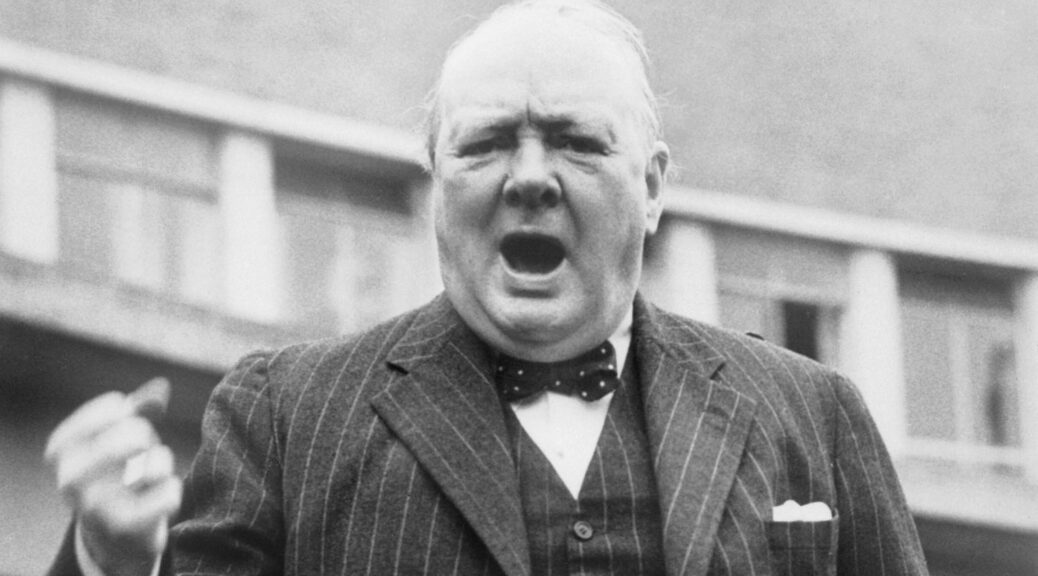
Churchill on Jargon: “Let Us Have an End to This Grimace”
Talk about jargon. Many years ago, in a galaxy far away, I was instructed on editorial content:
You want to stress content symbiosis, innovative, provocative and objective thinking, assessment of operational responsibilities, specific parameters targeted at a demographically mixed audience with varying tastes, discernment and intellectual approaches, ensuring that each medium reaches targeted audiences, making it more cross-generationally enticing, using more immediate and responsible electronic media.[1]
Was that jargon? We report, you decide. Such an astonishing number of words, all in one sentence, is liable to confuse somebody whose livelihood depends on communication, not obfuscation.
Jargon versus clarity
I did wonder at the time how Churchill, that peerless practitioner of English, would react to this kind of language. “Short words are best,” he said, “and the old words, when short, are best of all.”[2] Well now….
We can imagine what he would think about substituting fashionable jargon like “challenges” for handicaps or “issues” for difficulties. (“I have issues with my hotel bill,” a guest in front of me said. No, she had problems!)
What would Churchill make of that stand-by cliché “reaching out”? It is intentionally vague—meant to convey niceness. Would he wonder if it means a physical gesture? Or does it mean conversing, telephoning, writing, telegramming, faxing, emailing or tweeting? Instead of “reaching out,” what’s wrong with communicating?
Churchill would snort at catch-all jargon like “the rich” (for anyone earning a comfortable living), or tergiversations like “man-caused disaster” instead of “terrorism.” But even in his day he had his hands full. In 1950 he said:
I hope you have all mastered the official socialist jargon which our masters, as they call themselves, wish us to learn. You must not use the word “poor”; they are described as the “lower income group.” When it comes to a question of freezing a workman’s wages the Chancellor of the Exchequer speaks of “arresting increases in personal income”….
[Homes] are in future to be called “accommodation units.” I don’t know how we are to sing our old song “Home Sweet Home”…. “Accommodation Unit, Sweet Accommodation Unit, there’s no place like our Accommodation Unit.”[3]
“Let us have an end of such phrases…”
Churchill learned English from a Harrow master, Robert Somervell, who instilled in him a love of clarity and a hatred of discombobulation. To his colleagues in 1940 he said:
Let us have an end of such phrases as these: “It is also of importance to bear in mind the following considerations…” or “Consideration should be given to the possibility of carrying into effect….” Most of these woolly phrases are mere padding, which can be left out altogether or replaced by a single word. Let us not shrink from using the short expressive phrases, even if it is conversational.[4]
Years later he was still banging away: “In this debate we have had the usual jargon about ‘the infrastructure of a supra-national authority.’”[5]
Alas, woolly jargon has a long shelf-life, and “infra-” and “supra-” are with us yet.
Protesting the Ministry of Defence’s “barren, dismal, flatulent, platitudinous” 1947 White Paper, Churchill said:
It was one of those rigmaroles and grimaces produced by the modern bureaucracy into whose hands we have fallen—a kind of vague palimpsest of jargon and officialese with no breadth, no theme, and, above all, no facts.[6]
“Spit all this rubbish from their lips”
In 1942, Soviet Foreign Minister Molotov wrote a turgid memo about the Royal Navy, saying, that Russia “will be in a position to draw the necessary conclusions as to the real state of affairs, particularly in regard to certain irregularities in the actions of the respective British naval authorities.”
Churchill reacted to that remark with one of his favorite pejoratives: “This grimace is a good example of how official jargon can be used to destroy any kind of human contact, or even thought itself.”[7]
In Cardiff in 1950, Churchill added: “I hope to live to see the British democracy spit all this rubbish from their lips.”
Aye, and the other democracies with it. Any year now. There is still time, brother.
Endnotes
[1] It led to a long process ending with a resignation, which is something you need to do at least once in your life. I have never regretted resigning or being sacked.
[2] Winston S. Churchill (hereinafter WSC), The Times Literary Award luncheon, London, 2 November 1949, in Robert Rhodes James, ed., Winston S. Churchill: His Complete Speeches 1897-1963, 8 vols. (New York: Bowker, 1974), VII: 7885.
[3] WSC, Cardiff, Wales, 8 February 1950, In the Balance: Speeches 1949 & 1950 (London: Cassell, 1951), 181.
[4] Sir Martin Gilbert, ed., The Churchill Documents, vol. 15 Never Surrender, May 1940-December 1940 (Hillsdale, Mich.: Hillsdale College Press, 2011), 636.
[5] WSC, House of Commons, 27 June 1950, In the Balance, 291.
[6] WSC, House of Commons, 31 March 1947, Europe Unite: Speeches 1947 & 1948 (London: Cassell, 1950), 53.
[7] WSC, The Hinge of Fate (London: Cassell, 1951), 516.
Related reading
“Speaker Jitters: Churchill Had Them, Necessitating Strategy,” 2024.
“Churchill’s War Memoirs: Aside from the Story, Simply Great Writing,” 2023.
“Churchill’s Collected Essays, Invaluably Compiled by Michael Wolff,” 2023.
“The Most Important Thing About Education: Churchill at Bristol,” 2023.
“Scaffolding Rhetoric: Churchill in Congress, 1941,” 2022.







One thought on “Churchill on Jargon: “Let Us Have an End to This Grimace””
I appreciated your presenting Churchill’s comments regarding language. I share his disdain at the verbiage used on television such as “The weather is turbulent going forward.” If only verb tenses were taught today. I believe it is totally unfair to immigrants to misuse our fine English language. The prevalent confusion of verb tenses and the misuse or total lack of understanding of adjectives and adverbs is irritating to me.
Comments are closed.